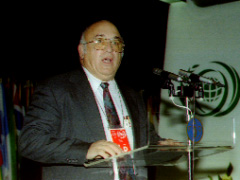


BAHAMAS | ||
The Honourable Pierre V. L. Depuch, Minister for Agriculture and Fisheries of the Commonwealth of the Bahamas | ||

I bring you greetings from the Government and people of the Commonwealth of the Bahamas on the occasion of this World Food Summit. May I convey the sincere apologies of my Prime Minister, the Right Honourable Hubert Ingraham, who is unable to attend. I would wish, Your Excellency, to congratulate you on your bold and imaginative initiative in convening this Summit. I am sure that it will profoundly affect our State and our use of the world's resources and that generations to come will benefit from the decisions taken here. I wish to thank the Government and people of Italy for being hospitable hosts for this Conference. May I also commend the World Food Summit Secretariat for their splendid preparatory work, not the least of which is the excellent series of technical papers that have been circulated over the past several months. The Commonwealth of the Bahamas is an archipelago of over seven hundred islands and keys covering some 200 000 square miles of the Atlantic Ocean. We lie just 50 miles East of Florida in the United States and extend 750 miles southwards to within 50 miles of Cuba, Haiti and the Dominican Republic. Our population at the end of 1995 was estimated at 278 000 people. Our land area covers some 5 385 square miles, of which about 1.5 percent is presently used for agriculture. The Government of the Bahamas has allocated additional land for agriculture to facilitate the growth and development of the sector. Our fisheries are among the richest in the region and we are developing strategic plans of action for their sustainable use. In 1994 we completed our agricultural census and in 1995 our fisheries census. The information from these has provided valuable baseline data from which is planned the future development of these two vital sectors. These sectors together employ some 12 000 persons and contribute to about 3 percent of our 3.5 billion dollar GDP. We are strongly of the view that the future of these two sectors lies in strengthening linkages to our tourism industry. This industry receives over 3.5 million visitors annually, is a main stay of our economy, and is currently showing strong economic resurgence. We would like to see local indigenous foods become a tourist attraction, and in respect of seafood, for the Bahamas to be known as the seafood capital of the Caribbean. The Bahamas is currently completing a national Food and Nutrition Policy with the assistance of the Pan-American Health Organization and the Caribbean Food and Nutrition Institute. This policy seeks to ensure an adequate supply of nutritious food for all Bahamians to reduce, as far as we are able, our dependence on imported food and to expand our food production for the export market. We recognize that the Bahamas is a long way from being self-sufficient in food production; indeed, we presently grow little of what we eat and the value of our exports from citrus, vegetables and fisheries' products falls far short of our food imports. However, we take the view that we must exploit our land and fisheries resources on a sustainable basis to meet the needs of our people and visitors. In this regard I am happy to say that the Bahamas has been a net exporter of fish both in terms of weight and value. My Government's policies are intended, therefore, to promote a healthy economy so as to ensure an adequate supply of nutritious food for the entire population, including the most socially disadvantaged of our society. We do not consider food supply as simply a matter of sufficiency but, through programmes of inter-ministry cooperation, are using education to encourage healthier eating habits. I wish to commit the Commonwealth of the Bahamas to the objectives and Plan of Action of the World Summit and to assure you, Mr. Chairman, that our budgetary resources will be deployed accordingly. It is our intention to increase the supply of Bahamian-grown food used in the tourism sector and to expand our fruit and vegetable exports so that we become economically more self-sufficient in food production. I believe that the outcome of this Summit will be a renewed commitment to global food production by all members and that the proposed action plans will in the short term impact greatly on food supply and world hunger. | ||
|
|
|
|

 |